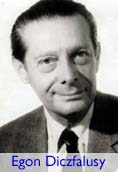Professor Egon Diczfalusy received his medical degree from the University of Szeged, Hungary in 1944: he moved to Sweden in 1946 and became a Swedish citizen in 1950. He obtained a Ph.D. degree at the Karolinska Institute in 1953 and an M.D. Degree in 1958.
He was Director of the Hormone Laboratory, Karolinska Hospital between 1948 and 1967, Director of the Reproductive Endocrinology Research Unit of the Swedish Medical Research Council between 1967 and 1981, Head of the Department of Reproductive Endocrinology at the Karolinska Institute between 1981 and 1986. He retired in 1987.
Professor Diczfalusy’s research contributions had been described in more than 500 publications dealing with various areas of obstetrical endocrinology (i.e. the establishment of the concept of the human feto-placental unit ) and gynecological endocrinology (studies on pituitary-ovarian function and contraception). Some 150 research fellows from 35 countries had been trained under his supervision. His work had contributed a great deal of improvement to the research and development of human reproductive health.
Professor Diczfalusy was consultant to the Ford Foundation’s Programme in Reproductive Sciences between 1962 and 1978. He became associated with the World Health Organizaton (WHO), expanded Programme of Research, Development and Research Training in Human Reproduction as a Consultant in 1972 and was Director of the WHO Collaborating Center for Research and Research Training Human Reproduction at the Karolinska Institute from 1970 to 1984. He is a Member of the World Health Organization Expert Advisory Panel on Human Reproduction since 1972 and Senior Consultant to the WHO Special Programme of Research in Human Reproduction since 1984.
Professor Diczfalusy is honorary doctor, honorary consultant, honorary member of Academic Institutions and National Societies of Obstetrics and Gynecology and/or Endocrinology in 18 countries.
All of his positions and responsibility from the 1960s to the present, he devoted himself to promote scientific researches and training in human reproduction in every aspect he could do, by training young scientists, writing books and scientific papers, conducting seminars and workshops as well as scientific meetings, giving advise to policy makers and major medical offices. His efforts of hard working all of his life, promotes medical researches in human reproduction strengthening madical institutes and expanding the good of fertility regulation and reproductive endocrinology for a better reproductive health. His contribution, all direct and indirect impact, has been accepted world wide, mostly in developing countries to improve the reproductive health of their people.
Thailand is one of the examples in his contribution. Social and medical scientists had been fully aware of Thai population growth rate since 1959. They tried to find measures in decreasing population growth and declared in the government policies. In 1969, Thai government had declared a policy to reduce population growth rate from 3.2 to 1.5 percent per year in on decade. Professor Egon Diczfalusy was the predominant expert from the World Health Organization at that time in gathering outstanding professors and scientists from every medical schools to conduct a seminar on “Human Reproduction and Family Planning” in 1969. From that scientific meeting, Mahidol University, Chulalongkorn University, and Chiangmai University had set up Collaborating Center for Clinical Research in Human Reproduction with World Health Organization, the Special Programme for Research, Development and Research Training in Human Reproduction in those medical schools. Many young scientists, research activities as well as scientific conferences have been supported and facilitated by him, Professor Egon Diczfalusy. Medical researches and health researches from these Thai medical schools have been major contribution to the improvement and development of Thai reproductive health, a bright future to Thai Society.
 |
Professor Egon Diczfalusy M.D.,Ph.D.Sweden
|

